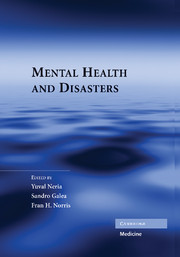Book contents
- Mental Health and Disasters
- Dedication
- Mental Health and Disasters
- Copyright page
- Contents
- Acknowledgments
- Contributors
- 1 Disaster Mental Health Research:
- Part One Concepts
- Part Two Psychopathology After Disasters
- Part Three Vulnerability And Resilience
- 9 Resilience after Disaster
- 10 Social and Cognitive Frameworks for Understanding the Mental Health Consequences of Disasters
- 11 Distinctions that Matter:
- Part Four Special Groups
- Part Five Interventions And Health Services
- Part Six Case Studies
- Part Seven Questions and Directions
- Index
9 - Resilience after Disaster
from Part Three - Vulnerability And Resilience
Published online by Cambridge University Press: 07 May 2010
- Mental Health and Disasters
- Dedication
- Mental Health and Disasters
- Copyright page
- Contents
- Acknowledgments
- Contributors
- 1 Disaster Mental Health Research:
- Part One Concepts
- Part Two Psychopathology After Disasters
- Part Three Vulnerability And Resilience
- 9 Resilience after Disaster
- 10 Social and Cognitive Frameworks for Understanding the Mental Health Consequences of Disasters
- 11 Distinctions that Matter:
- Part Four Special Groups
- Part Five Interventions And Health Services
- Part Six Case Studies
- Part Seven Questions and Directions
- Index
Summary
Keywords
- Type
- Chapter
- Information
- Mental Health and Disasters , pp. 145 - 160Publisher: Cambridge University PressPrint publication year: 2009
- 27
- Cited by



